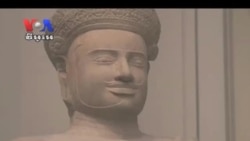PHNOM PENH —
Two 10th century Cambodian stone statues were returned to their homeland on Tuesday, in a high-profile case of allegedly looted artifacts.
They had been displayed for nearly two decades at New York's Metropolitan Museum of Art.
The voluntary return of the pair of "Kneeling Attendants" statues by one of America's foremost cultural institutions is seen as setting a precedent for the restoration of artworks to their places of origin, from which they were often removed in unclear circumstances.
It comes as the Cambodian government asks other museums to return similar objects.
Cambodian officials and Buddhist monks were on hand for a welcome ceremony for the life-size sandstone statues at the capital's international airport.
"It is important for the country, of course, for all of us Cambodians," said Chan Tani, Cambodian Secretary of State for the Cabinet Office.
"We got back what our ancestors left for us. So we should be proud of it."
The statues come from the Koh Ker temple in Siem Reap province, which is home to the famed Angkor Wat temples.
Officials say they were stolen from the temple in the 1970s.
The museum said the statues were given in pieces by different donors between 1987 and 1992.
"It's a great honour for us to participate in this ceremony and to see the return of these wonderful objects to Cambodia," said Maxwell Hearn, Head of the Asian Art department at the Metropolitan Museum of Art, during Tuesday's event.
The museum announced in May it was returning the statues after researchers discovered new evidence indicating that they had been illegally exported under Cambodian law.
A 1993 Cambodian law prohibited the removal of cultural artefacts without government permission.
Pieces taken after that date have stronger legal standing to compel their new owners abroad to return them.
But there is also general agreement in the art world that pieces were acquired illegitimately if they were exported without clear and valid documentation after 1970 - the year of a United Nations cultural agreement targeting trafficking in antiquities.
Chan Tani said the returned statues will first be displayed at the offices of Prime Minister Hun Sen, where there will be an international meeting this month of the U.N. cultural agency's World Heritage Committee. They will afterward be moved to Phnom Penh's National Museum.
Largely due to the social and political disruptions of war, widespread looting of Cambodia's ancient temples took place in the 1970s through the 1990s, with many items smuggled through Thailand. Associated Press, Phnom Penh.
They had been displayed for nearly two decades at New York's Metropolitan Museum of Art.
The voluntary return of the pair of "Kneeling Attendants" statues by one of America's foremost cultural institutions is seen as setting a precedent for the restoration of artworks to their places of origin, from which they were often removed in unclear circumstances.
It comes as the Cambodian government asks other museums to return similar objects.
Cambodian officials and Buddhist monks were on hand for a welcome ceremony for the life-size sandstone statues at the capital's international airport.
"It is important for the country, of course, for all of us Cambodians," said Chan Tani, Cambodian Secretary of State for the Cabinet Office.
"We got back what our ancestors left for us. So we should be proud of it."
The statues come from the Koh Ker temple in Siem Reap province, which is home to the famed Angkor Wat temples.
Officials say they were stolen from the temple in the 1970s.
The museum said the statues were given in pieces by different donors between 1987 and 1992.
"It's a great honour for us to participate in this ceremony and to see the return of these wonderful objects to Cambodia," said Maxwell Hearn, Head of the Asian Art department at the Metropolitan Museum of Art, during Tuesday's event.
The museum announced in May it was returning the statues after researchers discovered new evidence indicating that they had been illegally exported under Cambodian law.
A 1993 Cambodian law prohibited the removal of cultural artefacts without government permission.
Pieces taken after that date have stronger legal standing to compel their new owners abroad to return them.
But there is also general agreement in the art world that pieces were acquired illegitimately if they were exported without clear and valid documentation after 1970 - the year of a United Nations cultural agreement targeting trafficking in antiquities.
Chan Tani said the returned statues will first be displayed at the offices of Prime Minister Hun Sen, where there will be an international meeting this month of the U.N. cultural agency's World Heritage Committee. They will afterward be moved to Phnom Penh's National Museum.
Largely due to the social and political disruptions of war, widespread looting of Cambodia's ancient temples took place in the 1970s through the 1990s, with many items smuggled through Thailand. Associated Press, Phnom Penh.










